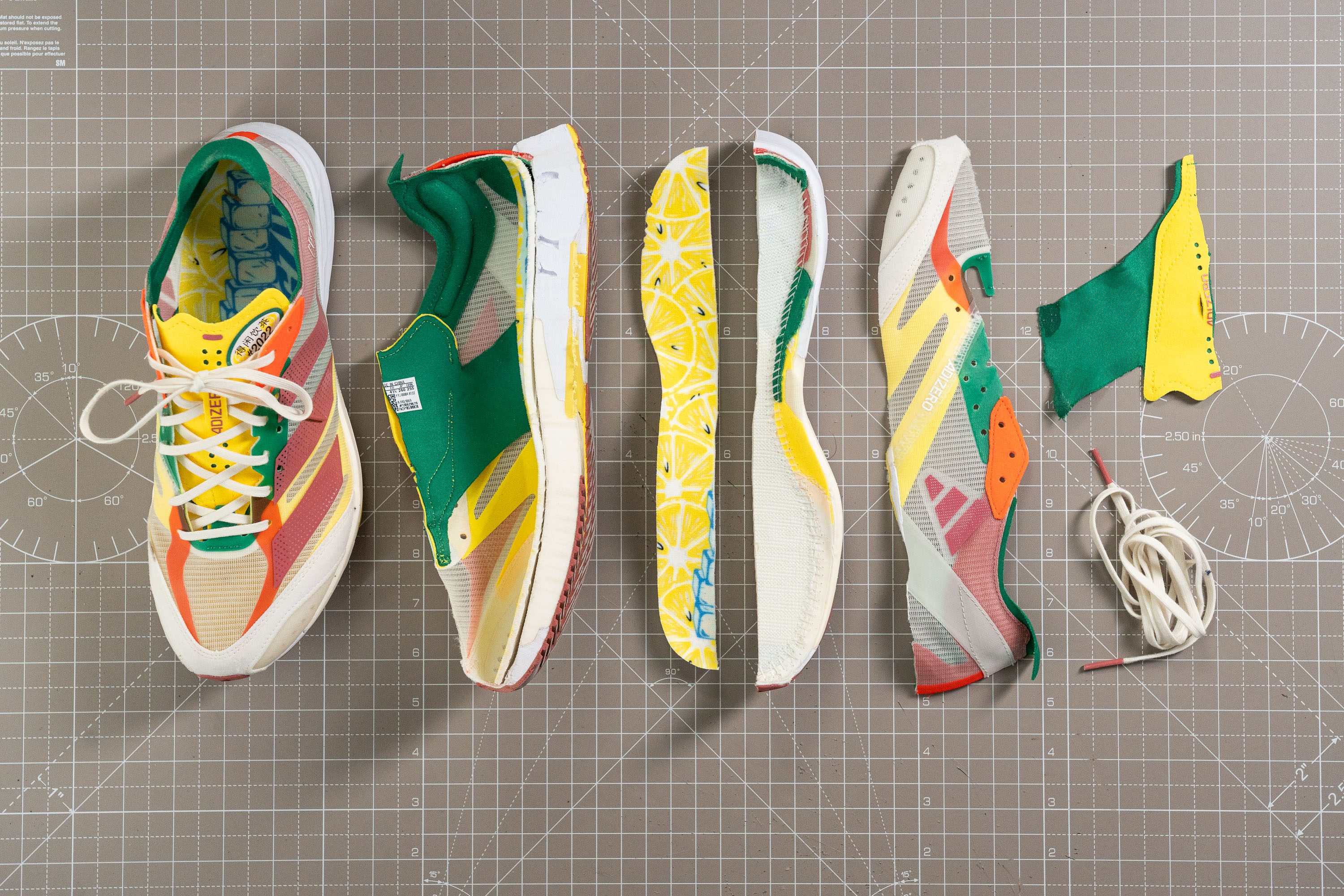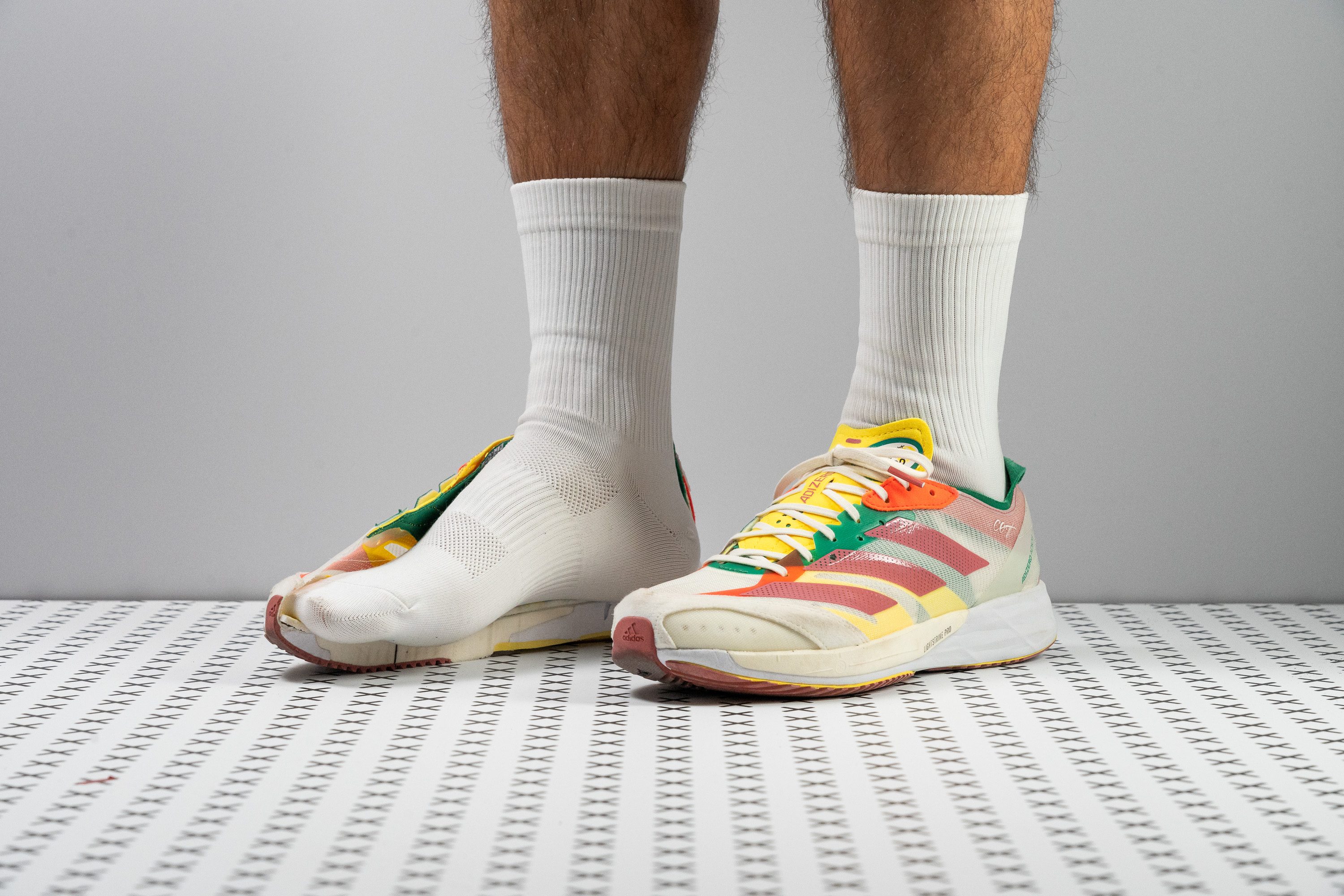Our verdict
Pros
- Snappy ride
- Great for fast track workouts
- Well ventilated
- Amazing ground feel
- Lighter than ever
- The outsole lasts forever
- Grippy Continental rubber
- Modestly priced
Cons
- Not for cold weather
- Heel slippage
- Needs more Lightstrike Pro
- Ride is too firm
Audience verdict
Comparison
The most similar running shoes compared
+ + Add a shoe | |||||
|---|---|---|---|---|---|
| Audience score | 81 Good! | 90 Superb! | 84 Good! | 92 Superb! | |
| Price | $130 | $130 | $135 | $140 | |
| Pace | Tempo | Daily runningTempo | Daily runningTempo | CompetitionTempo | |
| Shock absorption | - | High | Moderate | Moderate | |
| Energy return | - | Moderate | Low | High | |
| Traction | - | High | High | High | |
| Arch support | Neutral | Neutral | Neutral | Neutral | |
| Weight lab Weight brand | 7.5 oz / 212g 7.5 oz / 212g | 8.6 oz / 245g 8.4 oz / 238g | 7.7 oz / 217g 7.6 oz / 215g | 6.2 oz / 176g 6.2 oz / 176g | |
| Lightweight | ✓ | ✓ | ✓ | ✓ | |
| Drop lab Drop brand | 8.7 mm 8.0 mm | 8.2 mm 9.0 mm | 5.9 mm 5.0 mm | 6.2 mm 7.0 mm | |
| Strike pattern | HeelMid/forefoot | HeelMid/forefoot | Mid/forefoot | Mid/forefoot | |
| Size | Slightly small | Half size small | Half size small | Slightly small | |
| Midsole softness | Balanced | Balanced | Soft | Soft | |
| Difference in midsole softness in cold | Normal | Small | Small | Small | |
| Toebox durability | - | Bad | Bad | Bad | |
| Heel padding durability | - | Good | Good | Good | |
| Outsole durability | - | Decent | Decent | Good | |
| Breathability | Breathable | Breathable | Breathable | Warm | |
| Width / fit | Medium | Wide | Wide | Medium | |
| Toebox width | Narrow | Medium | Wide | Narrow | |
| Stiffness | Stiff | Moderate | Moderate | Flexible | |
| Torsional rigidity | Stiff | Moderate | Stiff | Flexible | |
| Heel counter stiffness | Flexible | Flexible | Moderate | Flexible | |
| Heel lab Heel brand | 31.6 mm 27.0 mm | 34.9 mm 35.0 mm | 32.8 mm 34.5 mm | 25.0 mm 28.0 mm | |
| Forefoot lab Forefoot brand | 22.9 mm 19.0 mm | 26.7 mm 26.0 mm | 26.9 mm 29.5 mm | 18.8 mm 21.0 mm | |
| Widths available | NormalWide | NormalWide | Normal | Normal | |
| Orthotic friendly | ✓ | ✓ | ✓ | ✓ | |
| Season | SummerAll seasons | SummerAll seasons | SummerAll seasons | All seasons | |
| Removable insole | ✓ | ✓ | ✓ | ✓ | |
| Ranking | #568 Bottom 16% | #48 Top 13% | #255 Bottom 33% | #11 Top 3% | |
| Popularity | #629 Bottom 7% | #180 Top 47% | #134 Top 35% | #272 Bottom 28% |
Size and fit
Size
Adidas Adizero Adios 7 fits slightly small (23 votes).
Who should buy the Adizero Adios 7
The Adidas Adizero Adios 7 is a solid choice for:
- Anyone that needs a not-so-expensive but fast shoe.
- Fans of old-school racing flats.
- 5K/10K aficionados that want to do shorter-than-mile repeats on the track.
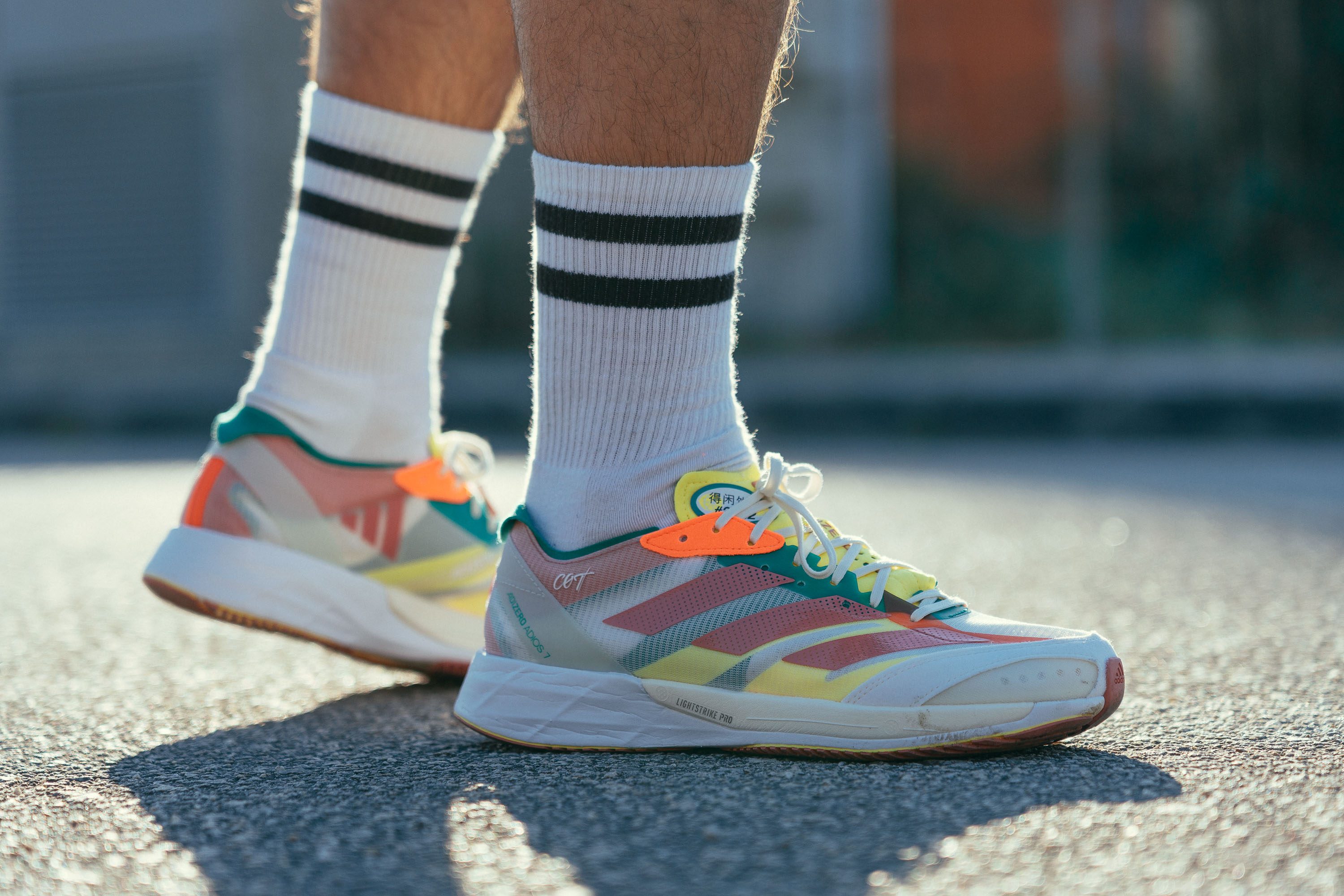
Who should NOT buy it
In our view, this shoe offers an energetic and potentially enjoyable ride, but it can also be physically demanding on the muscles.
If you typically train in shoes with modern, cushioned foams, this racing flat may not be the ideal choice for fast workouts or races, especially given the availability of the highly acclaimed and Lightstrike-Pro-based Adidas Adizero Adios Pro 3.
A solid training partner
The Adizero Adios line is dedicated to high-performance running. With the introduction of the Adizero Adios Pro series, Adidas has repositioned the non-Pro Adios as a reliable training partner for some—but not all—workouts.
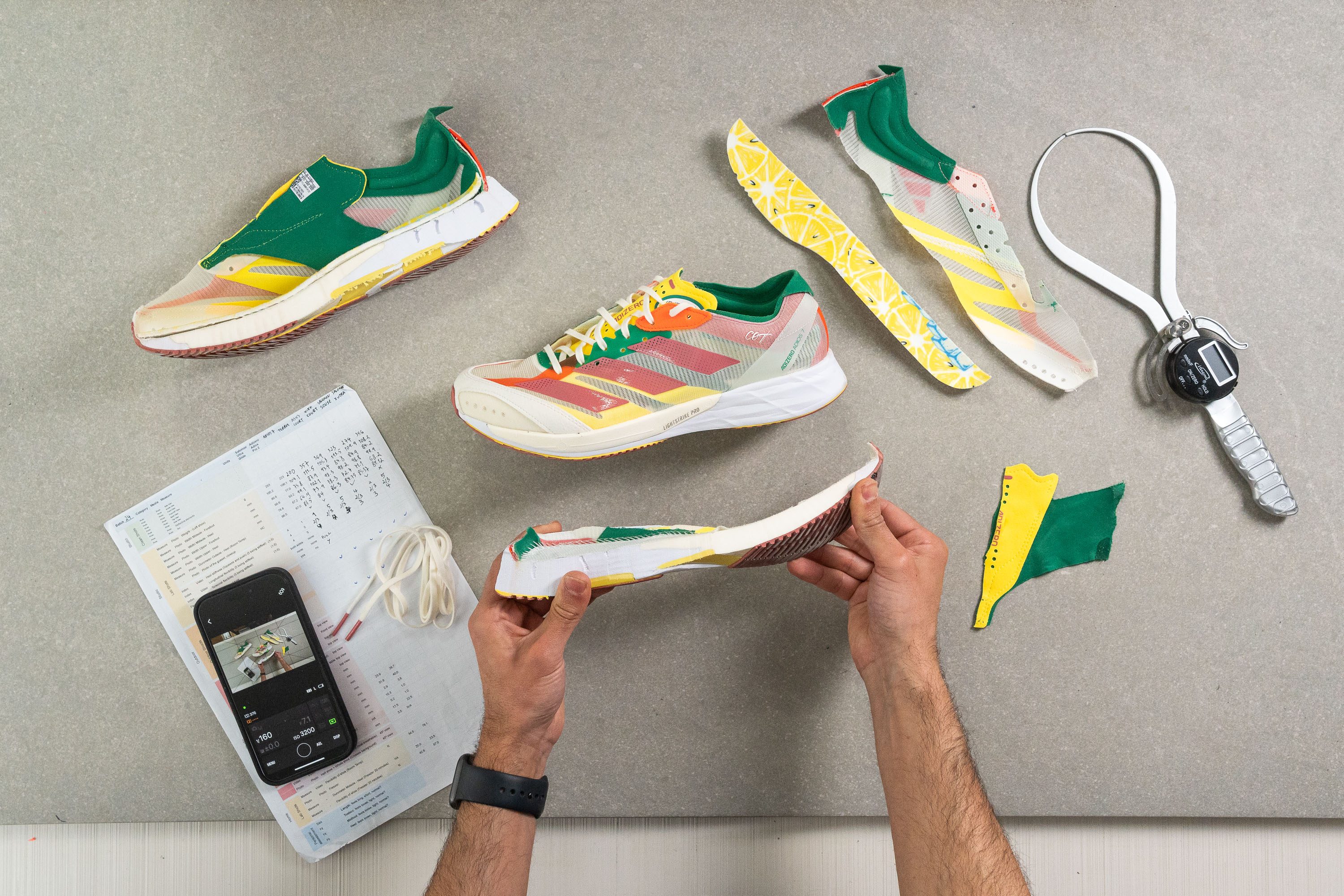
Hyper-breathable and light mesh upper
Adidas decided to move away from the Adizero Adios 6 and borrowed many features from the plasticky upper of the Adizero Adios Pro 3. To us, that seems like a welcome change as the upper got extra breathable and paper-thin!
With this upper, there were no other possible results in our breathability test than the maximum score: 5 out of 5!
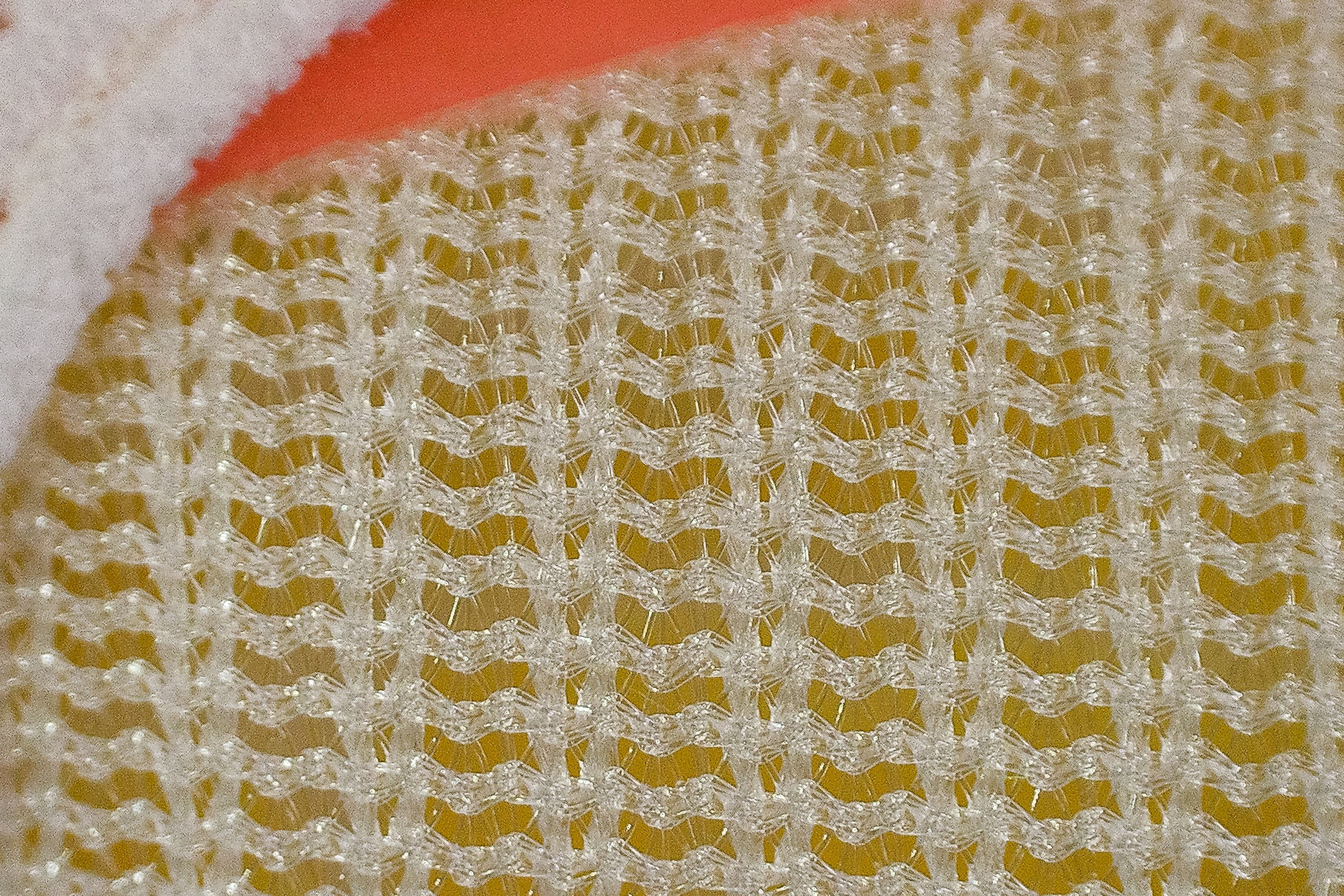
Blister alert!
Although the upper is transpirable and great, there is one potential caveat to be aware of. Unlike the monomesh upper featured in Adidas' high-end shoes, this one includes some sturdy lateral and medial forefoot overlays. While this is a plus in terms of durability, it may not be ideal for your big toe and, especially, your pinky toe.
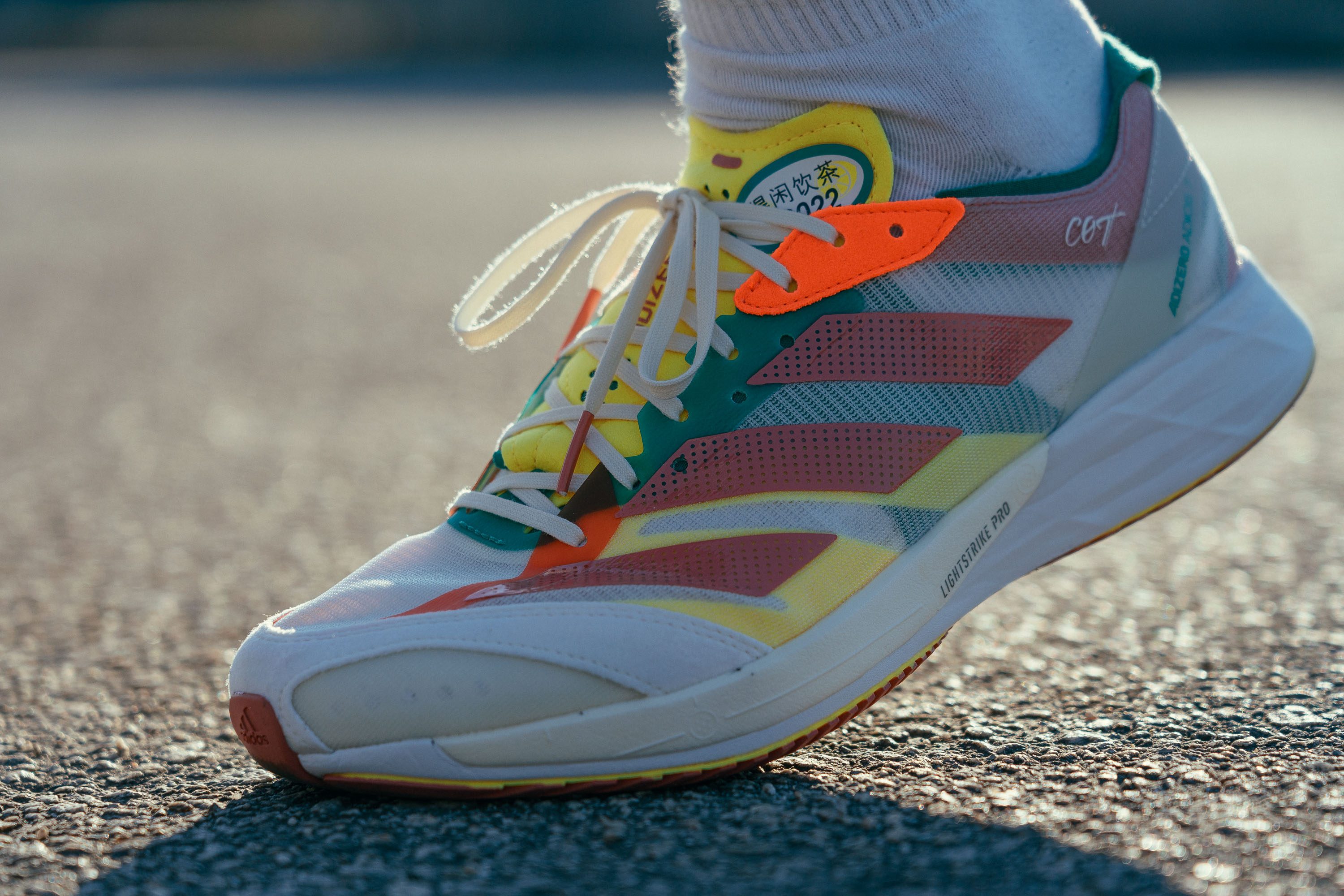
We think that creasing from the forefoot overlays is very likely to cause serious chafing and blisters.
Do you really need EnergyRods in this one?
Contrary to what you’ll find in the newest Takumi Sen, the Adios 7 does not have EnergyRods, the famous Adidas version of a carbon-fiber plate.
It's not like we were missing it in the Adios 7 but we felt as though this feature could enhance a snappy toe-off.
The brand chose to use a semi-rigid plastic shank to create propulsion in this racing flat. This was reflected in the shoe's torsional stiffness which we rated as 4 out of 5 (5 being the stiffest).
The dual midsole needs some break-in, but it’s really stable
To enhance durability and maintain affordability, Adidas utilized a dual-foam design in the Adios 7:
- Lightstrike: This EVA-based foam is used in the majority of the midsole. While it is inexpensive and long-lasting, it may not offer the same level of bounce and cushioning as other foams.
- Lightstrike Pro: Known as a "superfoam", this TPEE-based material is renowned for its energy return and bounce, and that’s why Adidas included all of it in the midfoot and forefoot. Although it may not be as durable as regular Lightstrike, it is still considered one of the most long-lasting premium foams in the market.
Both foams need a break-in period of at least 3 or 4 runs to start feeling really great. What is obvious is that the Adidas Adizero Adios 7 is not a plush shoe by any means. This makes its ride very responsive, fast, and a joy to run in for us!
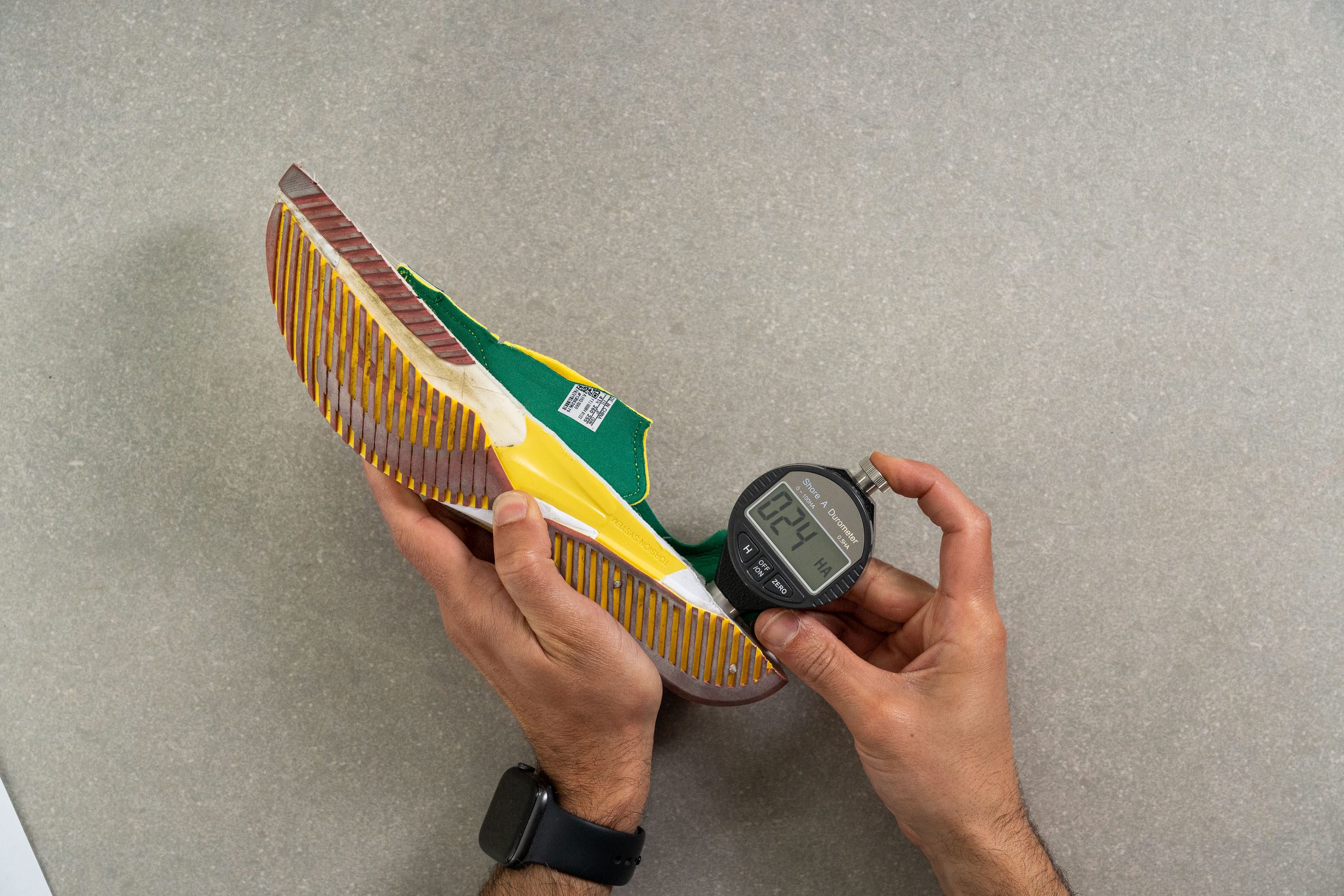
Regarding softness, our durometer measurements put the Adios 7 in the middle of the pack: 24.0 HA. This is exactly the same as the average of road running shoes. It is not particularly soft but not super firm either.
Drop and stack height: more of those old-school vibes...
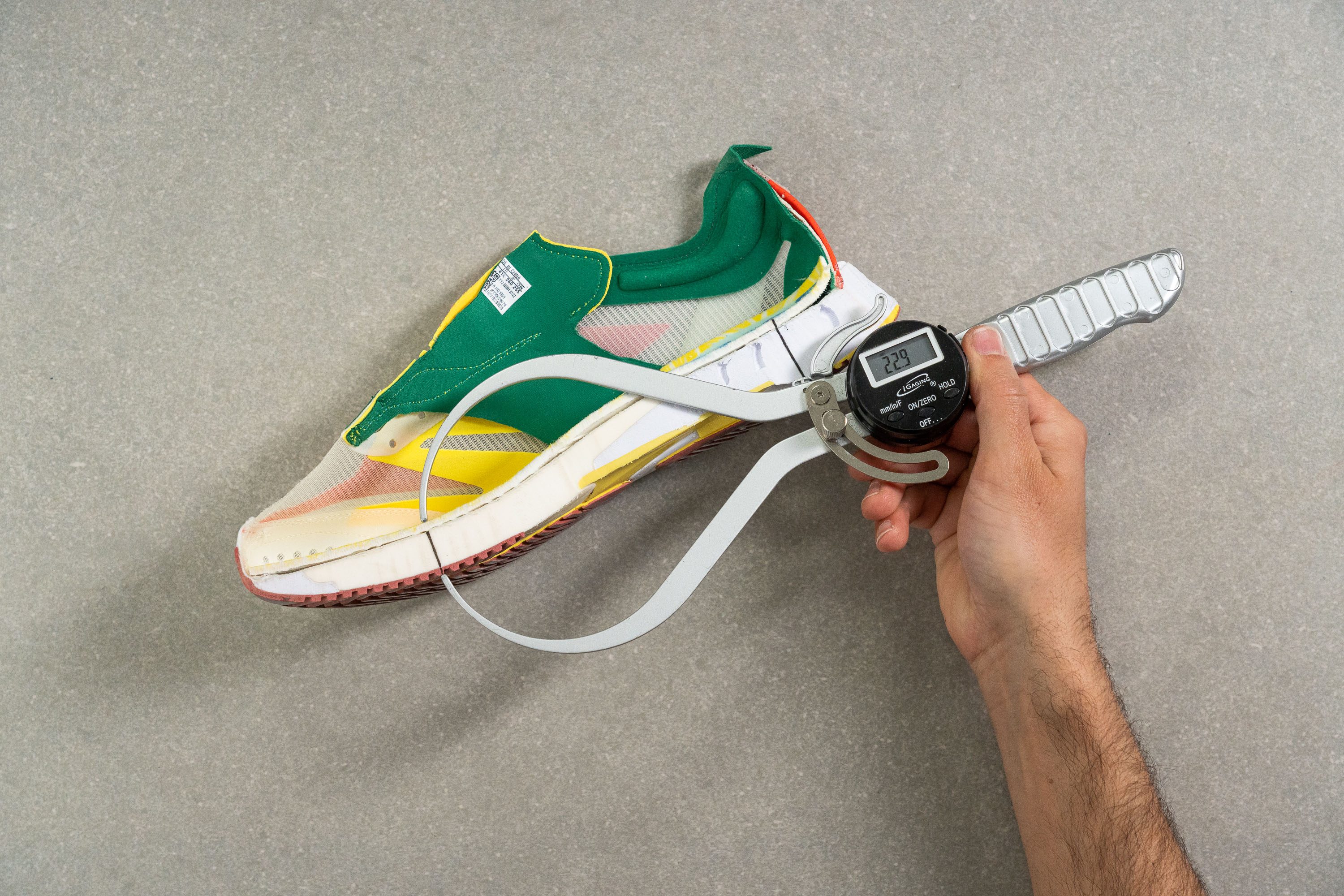
The current trend in the shoe industry is to increase the stack height, but the Adios 7 by Adidas goes against the grain. Its heel height measures 31.6 mm while the forefoot height is 22.9 mm, which is a few millimeters lower than the average stack height of road running shoes.
As for the drop, Adidas claims it to be 8 mm. There are no significant differences between what the brand says (8 mm) and our lab measurements (8.7 mm). Great!
Unconventional extra eyelets
Unlike most running shoes that offer just one extra eyelet at each side, the Adizero Adios 7 comes with 6 more, 3 on each side, giving you the flexibility to adjust the fit for a perfect, snug fit.
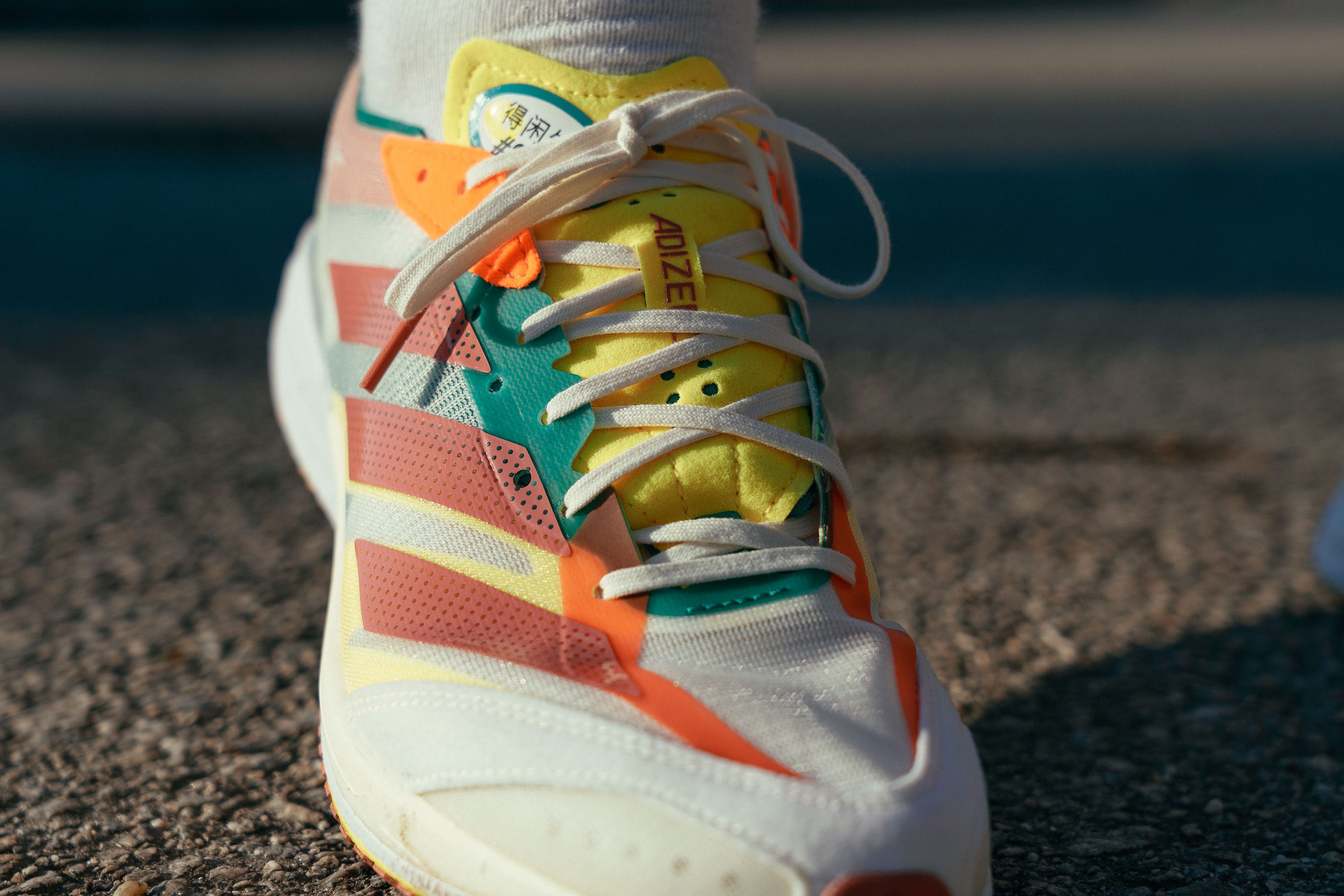
Why is it so frustrating that most brands refuse to drill a few extra—even weight-saving—holes in their shoes? It seems like such a simple design choice that could make a significant difference to get the perfect fit.
Stable platform that works wonders for heel strikers
Every Adizero shoe—because of its racing orientation—has been designed with a preferred midfoot-to-forefoot strike pattern since its very first model. This design choice explains why the Lightstrike Pro foam is only located in the forefoot in the Adios 7.
With that being said, heel strikers can still benefit from the firmer Lightstrike foam as it adds stability to the ride.
Possible heel slippage
Unfortunately, we were bothered by the occasional heel slippage in this Adidas sohe. And the only way to fix that would be to risk lave bites and strange our feet by cinching the laces real tight.
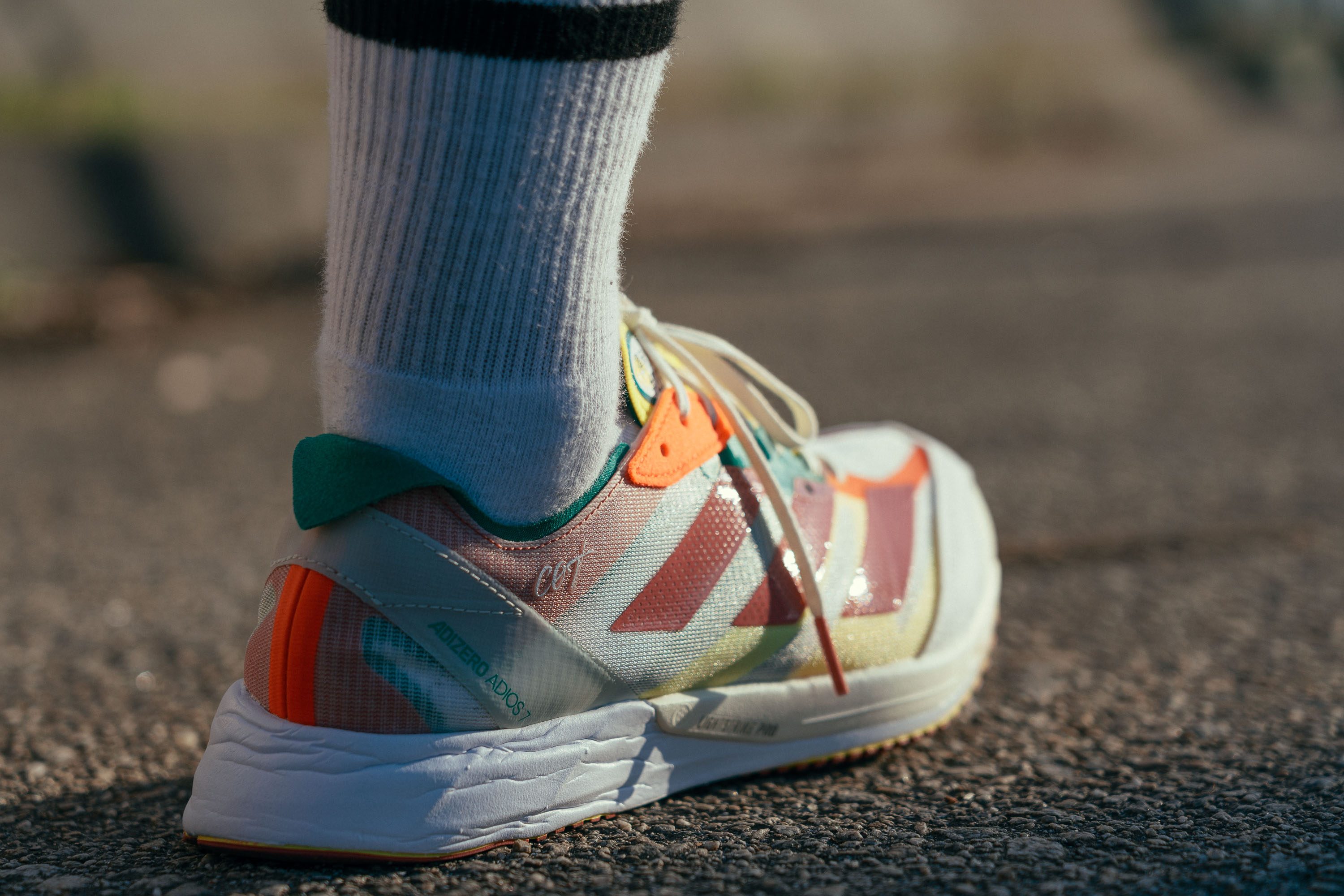
Because the laces are extremely thin and the tongue doesn't offer any protection, we found an alternative lacing technique to be handy in this case.
The Adios 7 has a super minimal and very flexible heel counter. It scored as low as 1 out of 5 in our heel counter stiffness test (1 being the most pliable). Similarly, when we looked inside the shoe, we discovered that there wasn't much padding in the heel area to lock the feet.
Grippy Continental outsole
The outsole has both good news and bad news. As always, let's start with the good news. It's grippy and it lasts long. Even after 500 km worth of wear tests, it still has little to no traces of wear and tear.
Continental rubber in the outsole never fails!
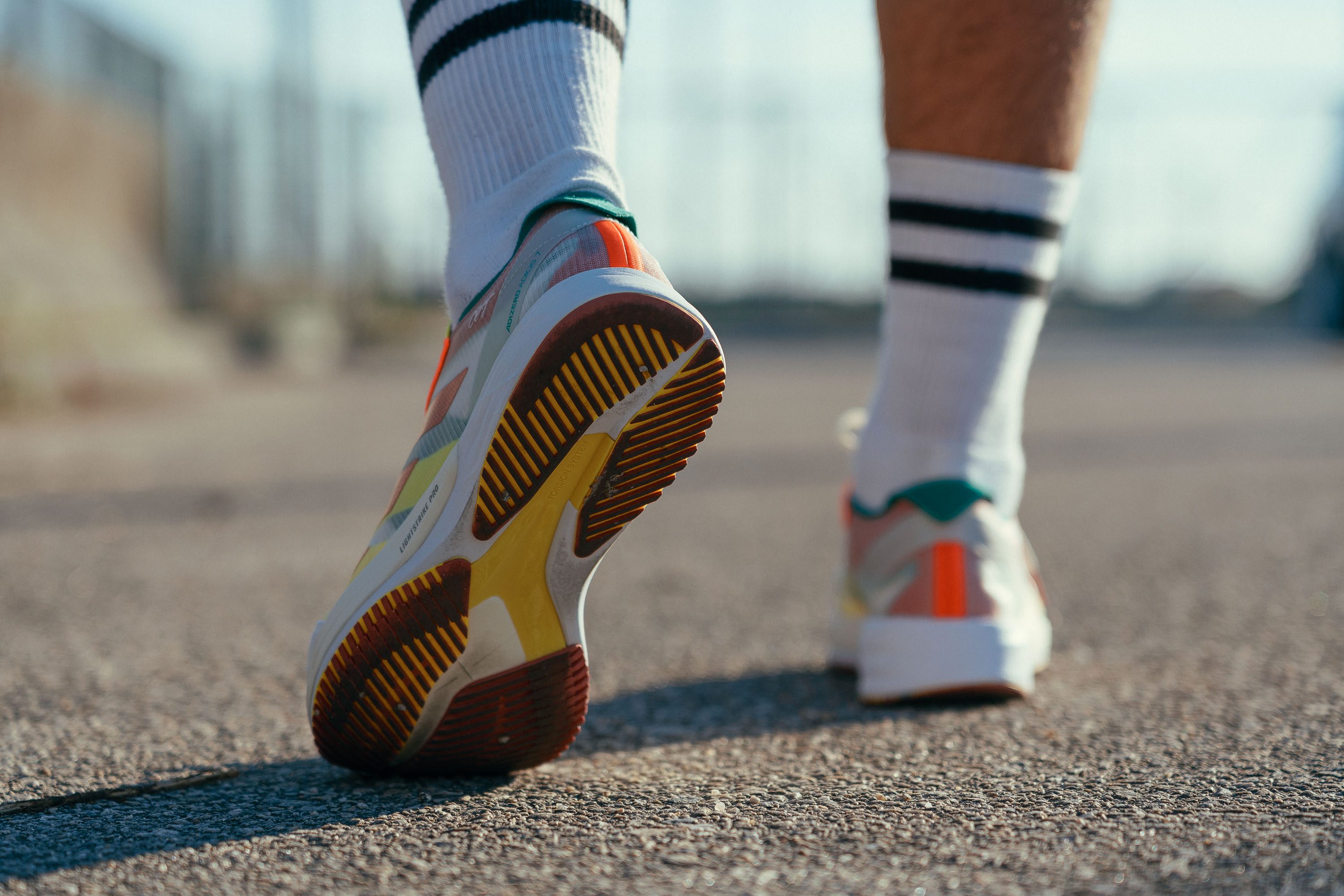
Now to the bad news. It's a hard compound, which is also the reason why it is so hard to scratch or wear out. It is so hard, you could hear us coming from a mile away!. For context, the sound it makes is an annoyingly slappy one.
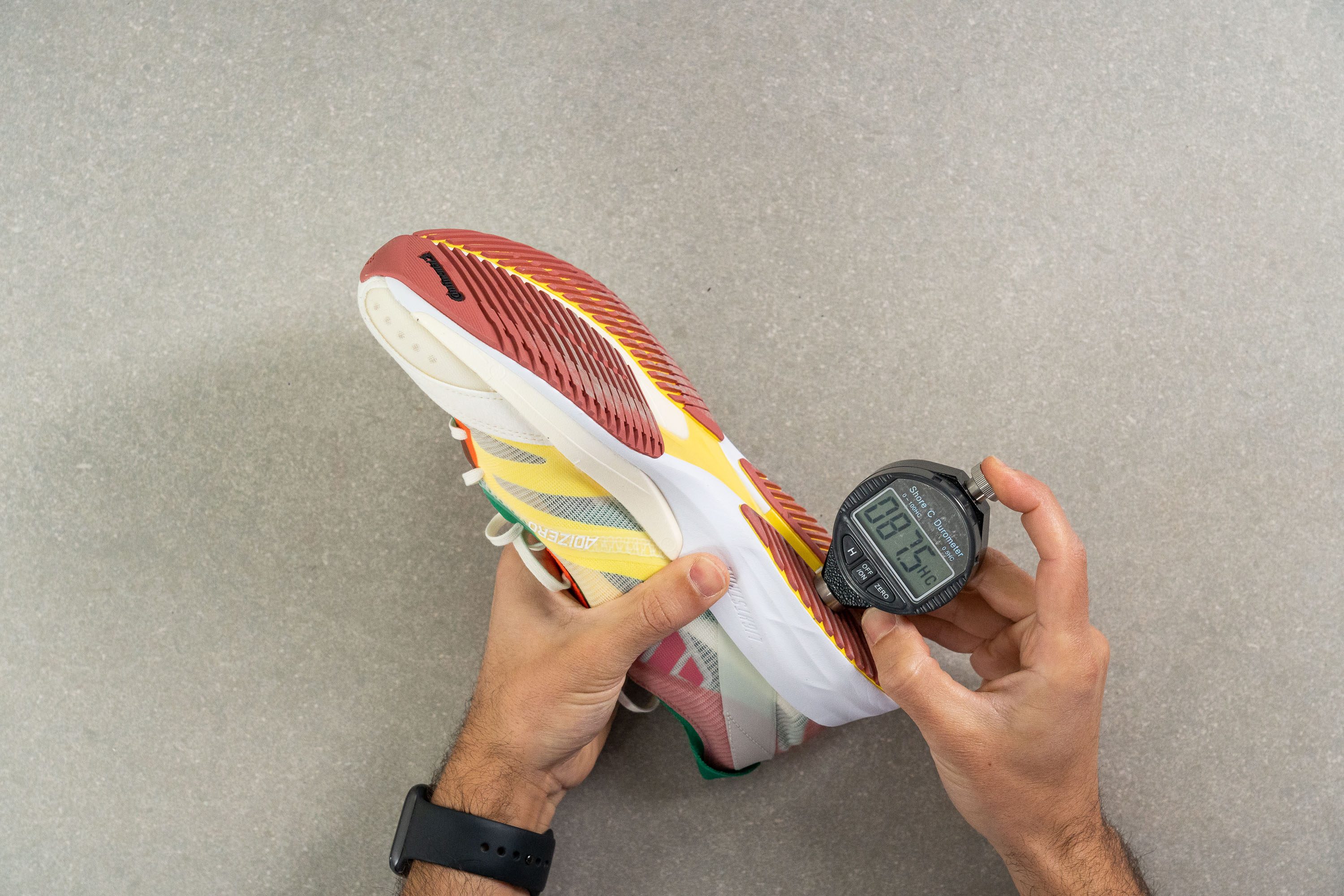
There is 3.4 mm of Continental rubber. Although this may appear modest, it's equivalent to the average shoe we examined in our lab.
It's worth noting that this shoe was crafted with a focus on minimizing weight. On the other hand, the rubber is 9% harder than the median measurement.
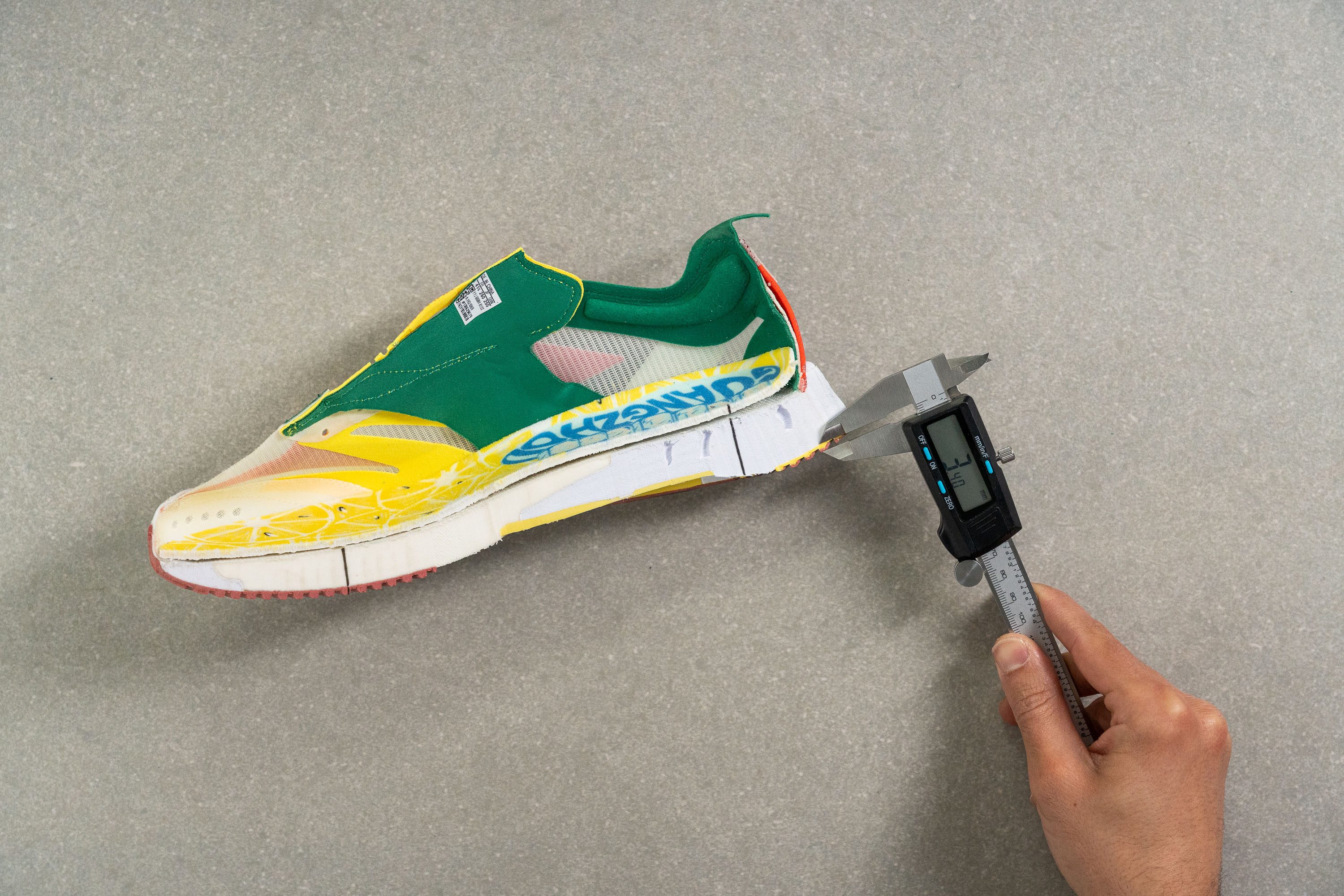
Not a good choice for slow long runs
Trying to do an easy run in this Adidas shoe didn't feel easy at all!
This shoe is not the versatile kind—you shouldn’t expect that at this point anyway—that can deliver greatness at any pace.
It's too firm for easy paces and too low-stacked to provide adequate cushioning for long runs. However, if you're seeking a shoe for short, fast bursts, you'll discover its wonderful sweet spot.
Racing flat vibes
The Adizero Adios 7 is just the opposite of any modern-day rockered shoe like the New Balance SuperComp Trainer or the On Cloudmonster. But that’s not a bad thing at all. A low-stack shoe without a rocker design is ideal for:
- High-intensity workouts where minimal ground contact time is desirable.
- Runners with great technique and a strong big toe.
- Anyone with stability problems or who just prefers a shoe with a more ground feel.
The Adizero Adios 7 takes it easy on the weighing scale
This update turned out to be significantly lighter than its predecessor.
The shoe weighs 7.5 oz (212 g) in men’s US 9. That means over an ounce less than the Adizero Adios 6 (8.6 oz/244g). What a successful diet!
Thin tongue creates lace bite risk
The tongue of this shoe is remarkably thin, measuring only 1.8 mm, and lacks any padding. This increases the risk of experiencing lace bite if the super-flat laces are tightened too much, which is often necessary during fast-paced runs.
While it's understandable for an Adios shoe to have a thin tongue that shaves some weight, other features like the thick Continental rubber outsole make us think that the Bavarians think of this one as a training companion.
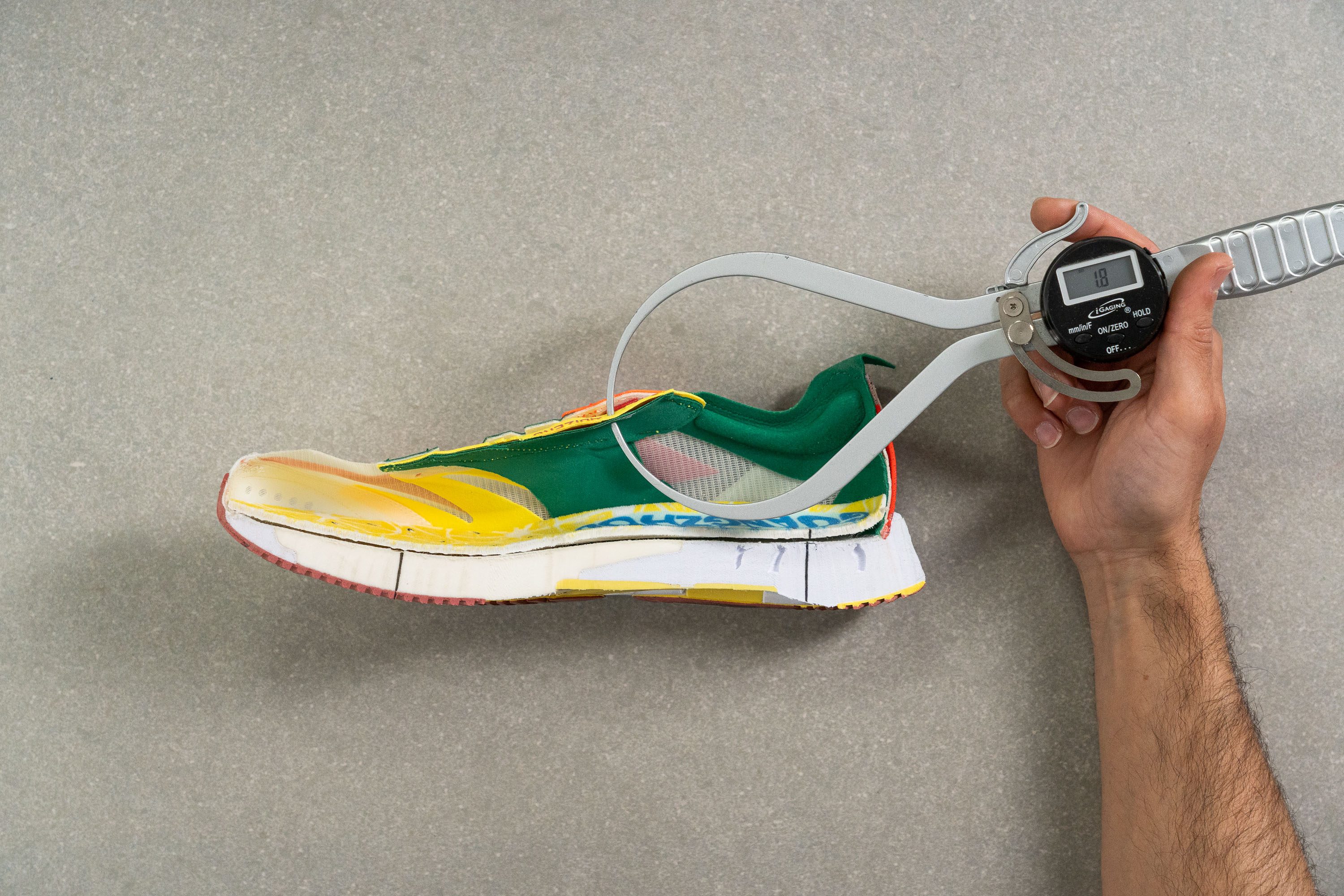
Therefore, adding some padding to the tongue would have been a great idea and we expect to see that in its next update.
Fortunately, there's some good news. The shoe's semi-gusseted tongue stayed in place all throughout the run.
It runs remarkably narrow on the heel…
The base of this Adidas shoe is astonishingly narrow in the heel! Our caliper shows a record 75.8 mm! Over 14 mm narrower than average!
It almost feels like the shoe is going to punish you for landing on the heel.
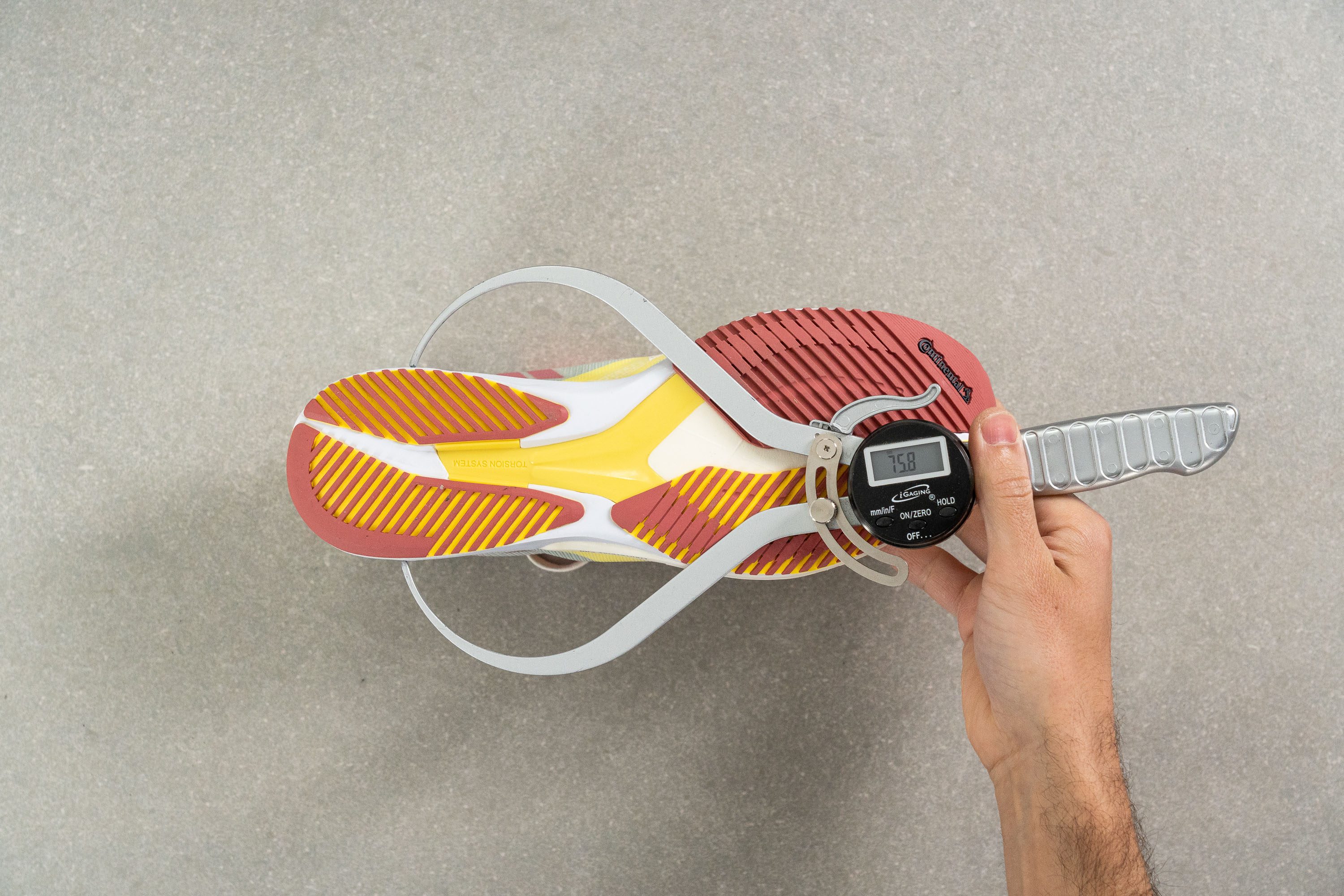
It is also narrower than a Metaspeed Sky (79.8 mm), an Adizero Adios Pro 2.0 (77.0 mm), and a Saucony Endorphin Pro 3 (86.0 mm).
…And gets impossibly narrow around the toes
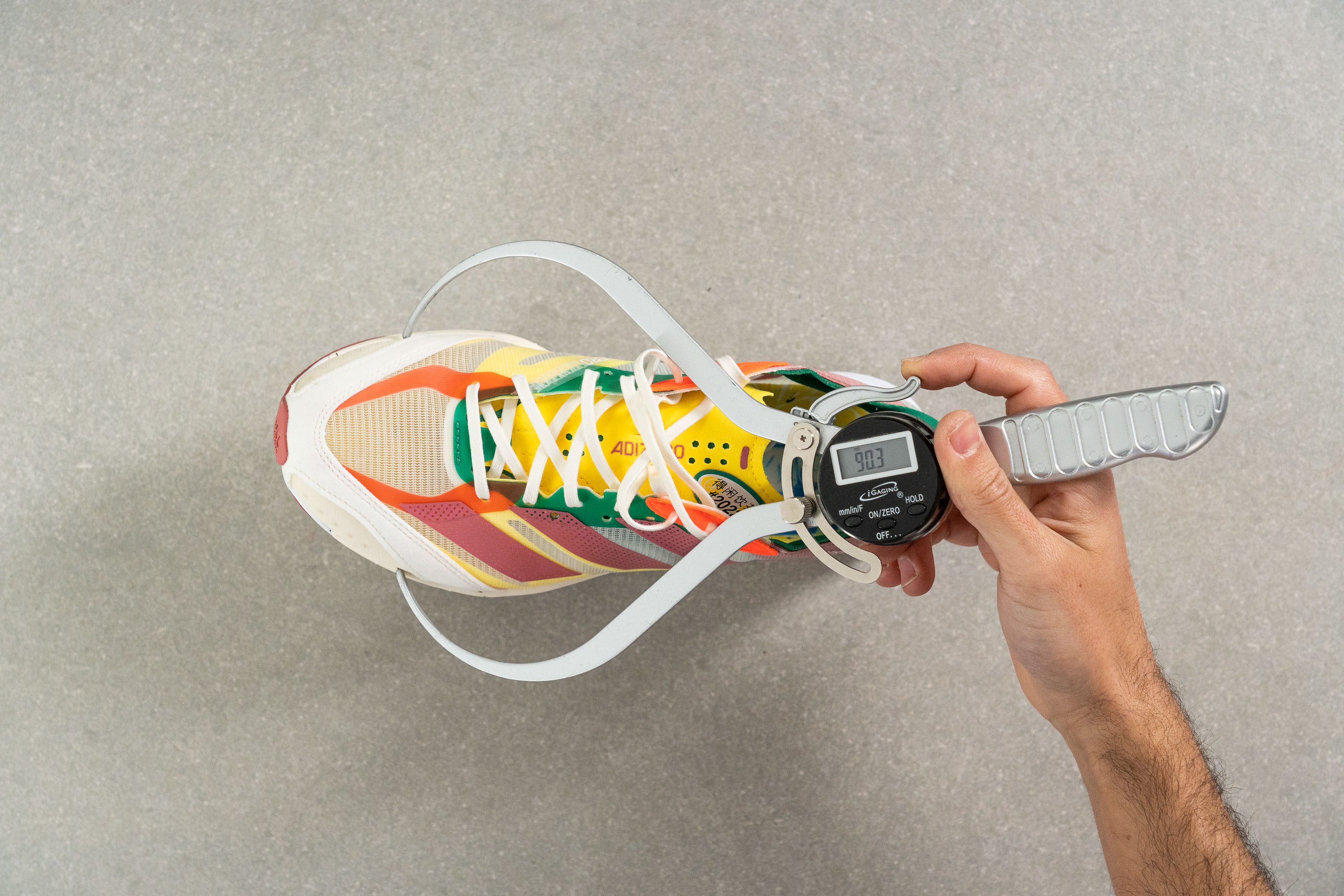
Instead of measuring just one area in the toe box, we prefer to take two measurements: one at the widest point and the other at the point where the big toe lands.
This approach is a more reliable approach to understanding how the shoe conforms to the shape of the foot in the toe box region.
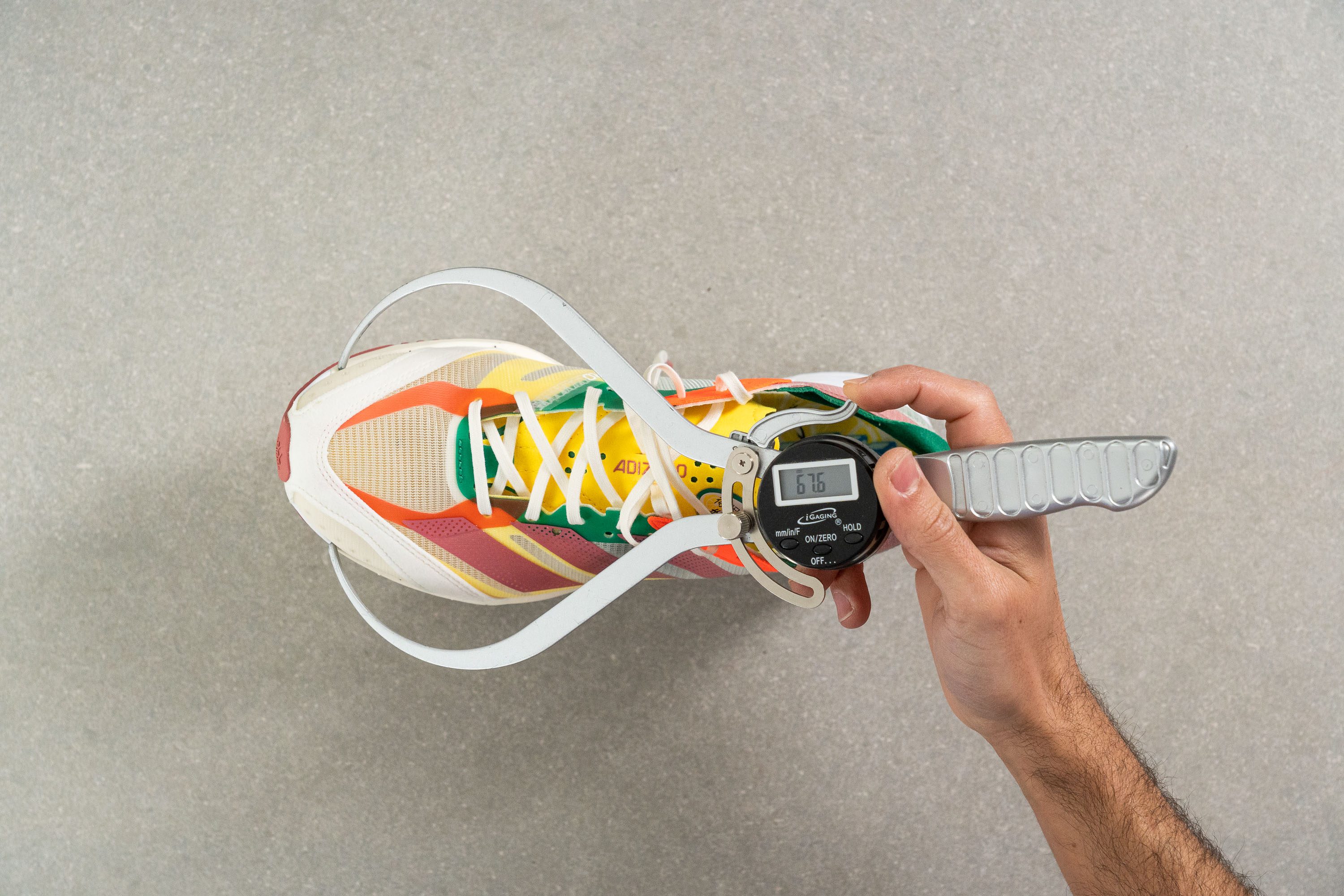
The Adizero Adios 7 features a remarkably aggressive shape, with a narrow toe box at its tip.
Our measurements show a 46.6% decrease between the two points we measured: 99.1 mm at the widest point and 67.6 mm where the big toe lands. In comparison, a similar shoe like the Nike ZoomX Streakfly has a 27.4% decrease with measurements of 95.4 mm and 74.9 mm, respectively.
If you are prone to having issues with your big toe or pinky toe, maybe the Adios 7 is not the best choice for your feet.
Hardens up in winter
Some running shoes can harden up a lot under cold temperatures. Unfortunately, the Adizero Adios 7 with its big chunk of Lightstrike EVA-based foam falls into that category, which is especially concerning for a shoe that is already considered firm.
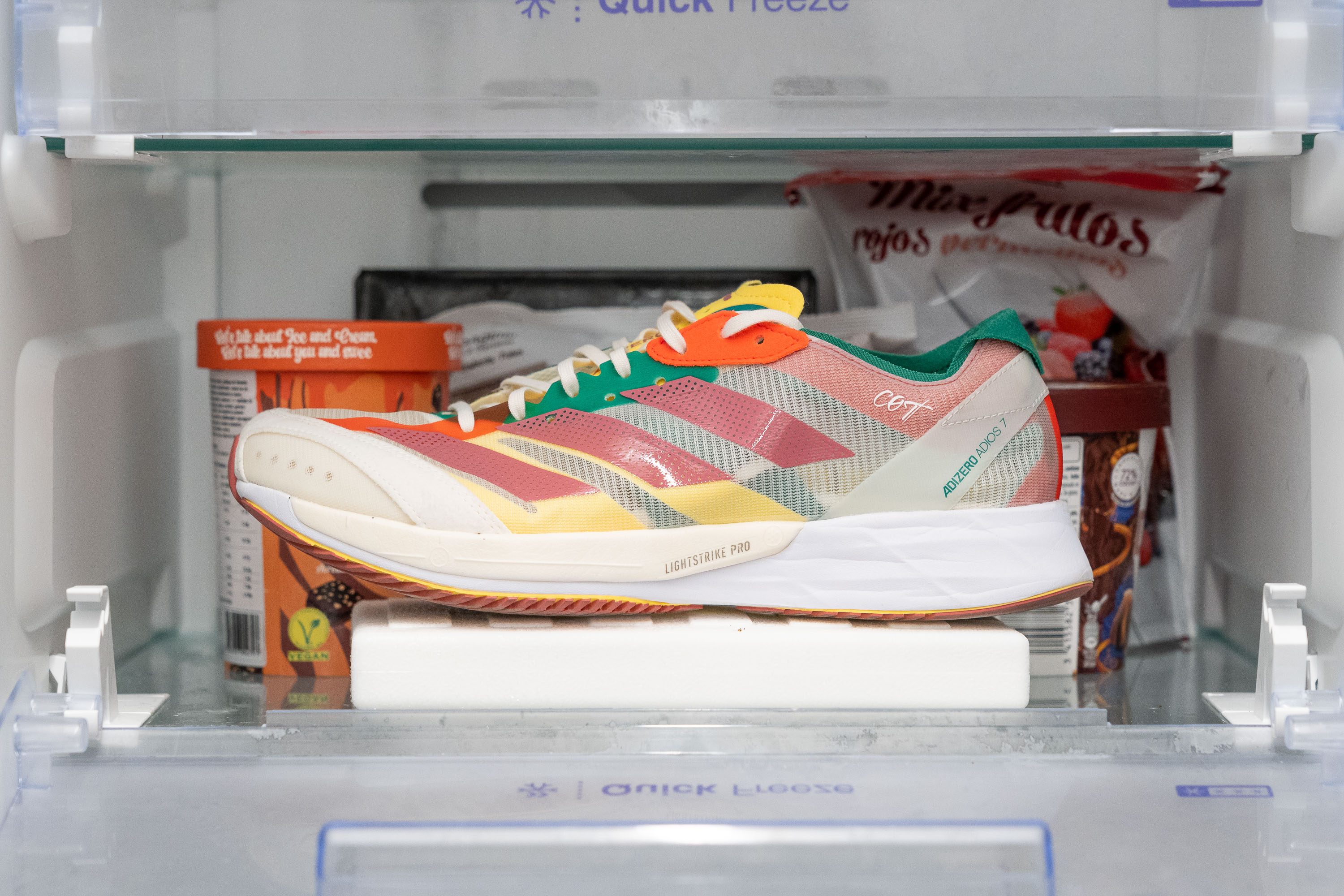
On average, shoes become 26.9% harder after being exposed to freezing temperatures for 20 minutes in our lab. The Adizero Adios 7 is slightly above that threshold, with a score of 27.5%. For reference, the Adizero Adios Pro 2.0, which features full-length Lightstrike Pro foam, only hardens by 4.4%.
Good looks are appreciated
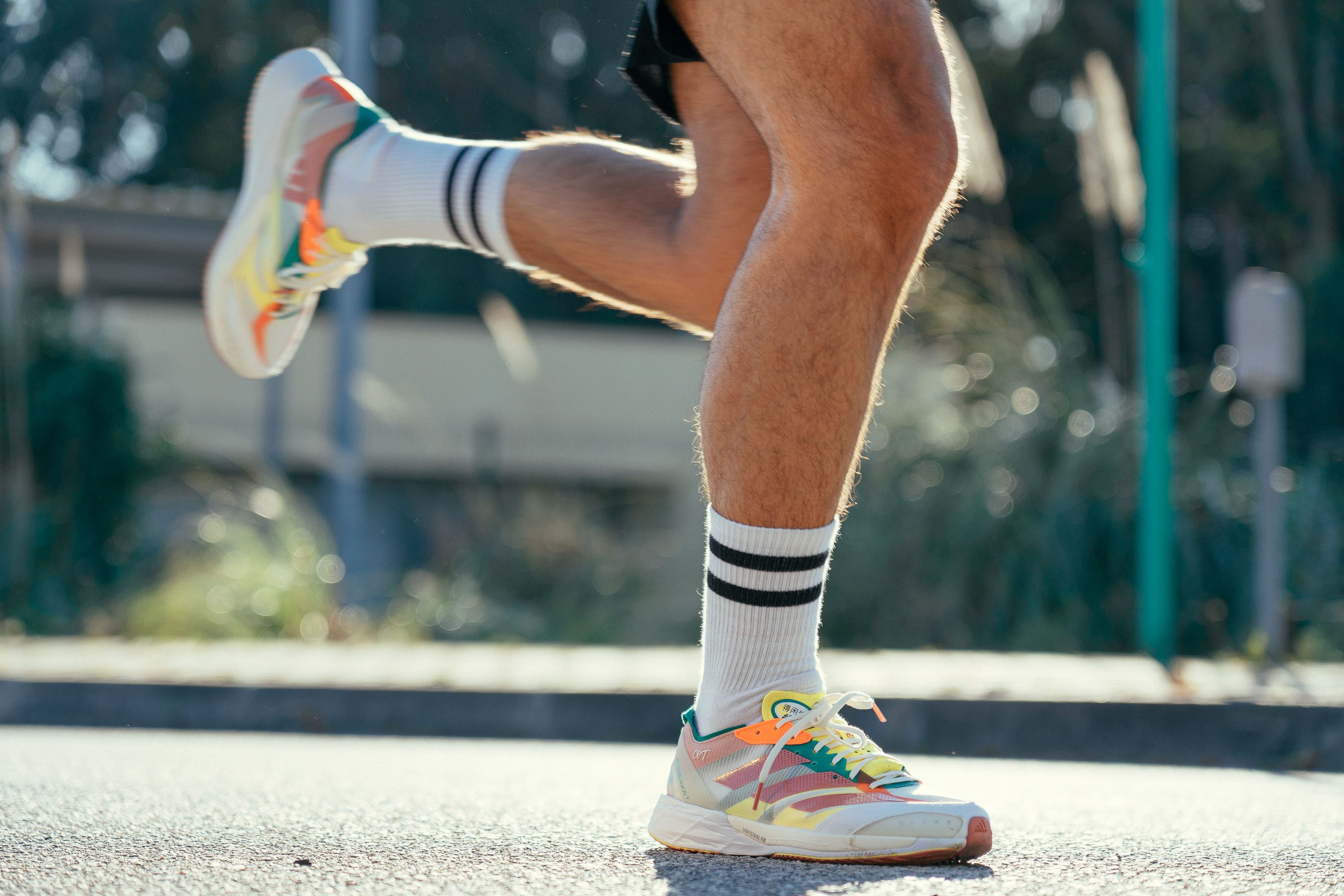
It's not unknown that Adidas running shoes are killing it in the style department, and the Adios 7 is no exception. It can be painful to choose just one of the shoe's striking colorways.
A durable worthwhile investment
On average, racing flats cost $146 a pair. But at $130, we find the Adidas Adizero Adios 7's price tag very reasonable. But even at full price, this shoe is a worthwhile investment, capable of devouring hundreds of workouts…unless you're a super-high-mileage runner!
